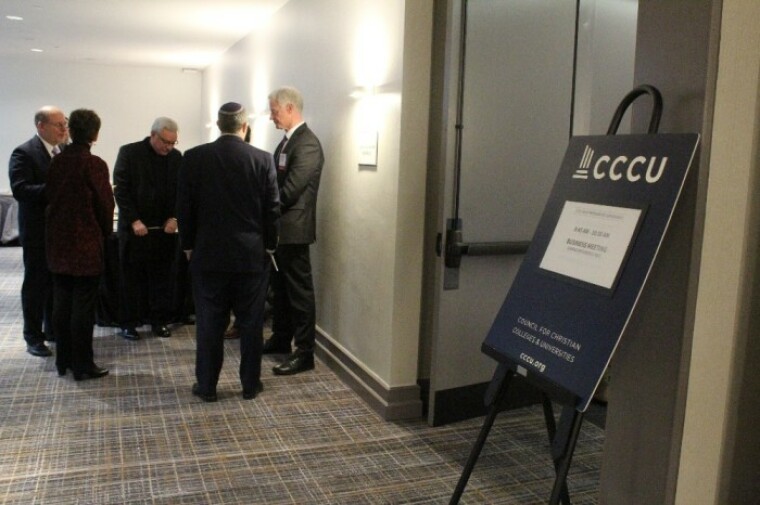CCCU vice chair admits there is 'risk' associated with its LGBT compromise

A board member for one of the largest Christian college associations in the country admits that there is "risk" associated with its recent push for legislation that would provide LGBT discrimination protections in exchange for religious exemptions for traditional Christian beliefs on sexuality.
Shirley Mullen, president of Houghton College in Western New York and vice chair of the board of directors for the Council for Christian Colleges and Universities, defended the 180-school network's support for the "Fairness for All" initiative during a lunch discussion with reporters Friday at the CCCU's annual Presidents Conference on Capitol Hill.
The conference was held a little over a month after it was made public that CCCU and the National Association of Evangelicals had issued their supportfor an initiative that would amend civil rights law to provide legal protections on the basis of sexual orientation and gender identity when it comes to employment, public accommodations and housing.
At the same time, the legislative construct seeks to attain exemptions for religious institutions and individuals to operate and live in accordance with traditional Christian teachings on marriage and sexuality that dictate that marriage is between one man and one woman without fear of government reprisal.
The initiative was praised by some prominent evangelicals who said it puts down "markers in an important conversation" at a time in which the larger culture is pushing back against traditional Christian views on sexuality and marriage.
However, dozens of other evangelical leaders signed on in opposition to the Fairness for All initiative and some have said that the initiative would end in the eventual coercion to embrace certain beliefs on human sexuality.
Critics believe that Fairness for All support is a sign that the CCCU and NAE have caved in on the conversation.
But according to Mullen, who is a board member of both organizations, that is not the case.
During the lunch, Mullen addressed concerns that conservative Christians have expressed about the Fairness for All initiative, which has also been backed by other religious organizations such as the Church of Jesus Christ of the Latter-day Saints.
"What Fairness for All is doing is really trying to speak through into the misconception of the larger culture that in the Christian tradition, we are somehow bigots," Mullen said. "Fairness for All is saying, 'No, no, no, no! We are the ones who are trying to honor that public space, which then allows people, as God allows people, to make these choices about if they are going to obey Him or if they are not going to obey Him."
Mullen asserted that Fairness for All is about trying to provide the ability for individuals to make "those fundamental personal choices" rather than "have the culture simply taking these options out of their hands."
While many Christian critics fear that such legislation would lead to an ultimate coercion for Christians to accept LGBT rights, Mullen said that members of the LGBT community who have been partners in the Fairness for All initiative have also received pushback from people in the LGBT community who believe that people of faith can't be trusted or won't "play fair" if such legislation were ever to pass.
"There is a risk to Fairness for All," she admitted. "Then, what I would say is that there is also a huge risk to not being in this dialogue. It's not just the risk of losing legal protection for our freedom of beliefs. It is also, I would say, losing that capacity to have the Christian community viewed as people who are respectful and who want to treat [with respect] human beings who differ from them in fundamental ways."
"The debate is not about the importance about the traditional view of marriage," she continued. "The debate is about the best strategy for preserving this."
She contested that the Fairness for All legislative construct is trying to put religious freedom on a level playing field with LGBT rights.
"Right now, the way our society is polarized, they are not on a level playing field," she contended. "The sense [in society now] is that one side has to win and one side has to lose."
She noted that another alternative to the Fairness for All approach and one that is expected to have success in the Democrat-controlled House of Representatives — the Equality Act — which would provide legal protections on the basis of sexual orientation and gender identity but would not provide the legal protections that the Fairness for All initiative is seeking.
"[I]t, in fact, stereotypes religious freedom ... as something that leads to violence," Mullen said. "Now, the Equality Act doesn't say this but I have actually heard people in higher education say that traditional religious protections are bigotry."
According to Mullen, the Fairness for All initiative is not about a "win-lose legal fight."
Since the U.S. Supreme Court legalized same-sex marriage nationwide in 2015, Christian college leaders have voiced concern that they could one day lose tax-exempt status of federal grants if some sort of religious exemption is not provided for them in law. If such protections are not passed, some Christian colleges fear that their hiring practices and on-campus policies could come under scrutiny.
In 2015, the state of Utah passed bills that were supported by LGBT organizations and the Church of Latter-day Saints that provided discrimination protections on the basis of sexual orientation and gender identity and also bolstered religious freedom exemptions. Utah is seen as the model to the Fairness for All approach.
Mullen assured that even though CCCU supports the Fairness for All initiative, the organization has not "weakened" on its advocacy for Christian institutions to live in accordance with the belief in the traditional view of marriage.
Read more from "CCCU vice chair admits there is 'risk' associated with its LGBT compromise" on The Christian Post.